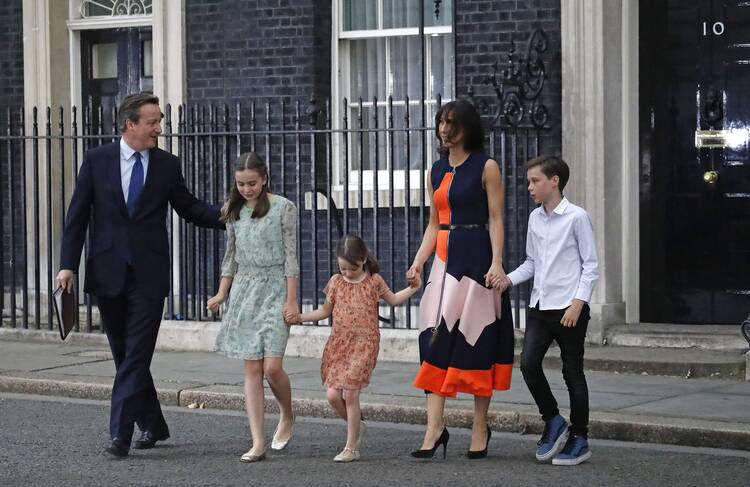For all our supposed refined gentility, the process for changing the leader of the government in the United Kingdom borders on the brutal. It bears comparison to a Stalinist putsch. We see it every time there is a change at Number 10 Downing Street.
Quite pitilessly, the incumbent prime minister has to make him or herself scarce. While the departing leader was on the 24 bus along Victoria Street, getting off at the stop by Westminster Cathedral, then strolling along to see Her Madge about resigning, the removal lorry was already observed reversing into the other end of Downing Street, the bit the tourists don’t see. There’s next to no transition. The perks mostly vanish: Chequers, the big house in the country; the new prime ministerial aircraft, which the tabloids have named “Dave Force One”; all the power.
Suddenly, brutally, it’s all over.
Hardly anyone is interested in your opinions and insights anymore, at least not until the memoirs get published. The staff of Number 10 will gather to applaud; a speech or two might be made. But your number’s definitely up. That’s what suddenly, cruelly, is happening to Tory P.M. David Cameron this week. Only the Downing Street cat, Larry, survives this coup, determined to sustain his own territorial battle with the Foreign Office feline, Palmerston.
Cameron’s departure, of course, is one aspect of the fallout from the Brexit vote. It was understood that he was likely to resign if he lost the referendum; quite clearly he didn’t think he would lose. The prime minister’s resignation triggered a contest for leader of the Tory party and initially, nobody appeared to want to join in the fun.
Several likely candidates ruled themselves out. The colorful Boris Johnson bailed out quite early in the process, fatally undermined by his collaborator in the Leave campaign, one Michael Gove, M.P., who described his former friend as “unfit to govern,” which most of us knew anyway. In turn, Gove, or at least one of his aides, had to admit to trying to rig the vote by sabotaging the campaign of Andrea Leadsom, M.P. Leadsom had emerged from anonymity, beat Gove in an early round of voting, then headed back to whence she came. Crude remarks about her rival Tory Theresa May’s suitability as a prime minister, according to Leadsom as a woman without children May was not properly vested in the U.K.’s future, followed by a cruder attempt to deny those remarks, ended Leadsom’s bid. But Gove also ended up dumped from contention.
One can imagine the fictional Frank Underwood brimming with pride at the spectacle and intrigue. Honestly, there were more knifed corpses all over the U.K. political stage than in one of Shakespeare’s history plays around the corner in the West End.
Cameron enjoyed his final, pre-obscurity Prime Minister’s Question Time on Wednesday the 13th. It was a remarkably jovial event, but nobody expected too many serious policy concerns to be aired. He had expected, indeed planned for, a leisurely withdrawal, presiding serenely over his final weeks, enjoying a few more rides on his new plane and getting to hang out with all his powerful pals at his final G20 summit.
Announcing his resignation the morning after the Brexit vote, he outlined a succession that would produce a new leader at his party’s autumn conference. But Leadsom’s withdrawal left May the only candidate; the election process became otiose. May might have spent the previous day measuring for new curtains at Downing Street but more likely she began an urgent compilation of a new cabinet, a job that she thought she would have weeks to complete if she won the leadership. One of the very first appointments is likely to be a high-powered job leading the Brexit negotiations that now must take place over the next two years.
A perceived democratic deficit became a topic of conversation as May prepared to step over Number 10’s threshold for the first time as prime minister. She was not elected by the people of the country to the position of prime minister; that is not how we do it in the United Kingdom. In our system the electorate elects a party, not a leader, into power. U.K. elections in recent decades have tended to look more and more presidential in the American sense, but there is no requirement for a midterm replacement premier to call a general election.
There have been a few other cases in living memory—John Major and “Sunny” Jim Callaghan among them—of prime ministers getting the keys to Downing Street without a popular vote. The alternative currently suggested, in all the post-Brexit uncertainty, is that any new leader needs the strongest possible mandate and so might decide to go to the country for a vote anyway.
It’s become moot whether a new election should be held to give May a fresh mandate, though the new prime minister was a tad embarrassed upon being reminded of her criticism of former Prime Minister Gordon Brown. Taking over from Tony Blair, Brown had hinted at calling an election to bolster his mandate but then backed off. He remained in power a further three years without an election.Meanwhile in another troubled precinct of the Westminster bubble, Labour Party members were trying their best to sabotage themselves and their plausibility as a government-in-waiting.
The party is still coming to terms with its failure to connect with real concerns that those “real” people, who had always hitherto provided its core vote, expressed so remarkably in the Brexit vote. When it comes to leadership elections, this party knows no limits to its self-destructive ability to mess up. Prime Minister May will not have an effective opposition leader to face for some time yet. This ought to be seen as a more grave democratic deficit than it has been because the people of this country deserve better.








